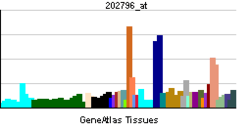SYNPO
Synaptopodin is a protein that in humans is encoded by the SYNPO gene.[3][4][5]
Function
Synaptopodin is an actin-associated protein that may play a role in actin-based cell shape and motility. The name synaptopodin derives from the protein's associations with postsynaptic densities and dendritic spines and with renal podocytes (Mundel et al., 1997).[supplied by OMIM][5]
Interactions
SYNPO has been shown to interact with MAGI1.[6]
References
- ↑ "Human PubMed Reference:".
- ↑ "Mouse PubMed Reference:".
- ↑ Mundel P, Heid HW, Mundel TM, Krüger M, Reiser J, Kriz W (Oct 1997). "Synaptopodin: an actin-associated protein in telencephalic dendrites and renal podocytes". The Journal of Cell Biology. 139 (1): 193–204. doi:10.1083/jcb.139.1.193. PMC 2139823
 . PMID 9314539.
. PMID 9314539. - ↑ Kikuno R, Nagase T, Ishikawa K, Hirosawa M, Miyajima N, Tanaka A, Kotani H, Nomura N, Ohara O (Jun 1999). "Prediction of the coding sequences of unidentified human genes. XIV. The complete sequences of 100 new cDNA clones from brain which code for large proteins in vitro". DNA Research. 6 (3): 197–205. doi:10.1093/dnares/6.3.197. PMID 10470851.
- 1 2 "Entrez Gene: SYNPO synaptopodin".
- ↑ Patrie KM, Drescher AJ, Welihinda A, Mundel P, Margolis B (Aug 2002). "Interaction of two actin-binding proteins, synaptopodin and alpha-actinin-4, with the tight junction protein MAGI-1". The Journal of Biological Chemistry. 277 (33): 30183–90. doi:10.1074/jbc.M203072200. PMID 12042308.
Further reading
- Adams MD, Kerlavage AR, Fleischmann RD, Fuldner RA, Bult CJ, Lee NH, Kirkness EF, Weinstock KG, Gocayne JD, White O (Sep 1995). "Initial assessment of human gene diversity and expression patterns based upon 83 million nucleotides of cDNA sequence" (PDF). Nature. 377 (6547 Suppl): 3–174. PMID 7566098.
- Hartley JL, Temple GF, Brasch MA (Nov 2000). "DNA cloning using in vitro site-specific recombination". Genome Research. 10 (11): 1788–95. doi:10.1101/gr.143000. PMC 310948
 . PMID 11076863.
. PMID 11076863.
- Wiemann S, Weil B, Wellenreuther R, Gassenhuber J, Glassl S, Ansorge W, Böcher M, Blöcker H, Bauersachs S, Blum H, Lauber J, Düsterhöft A, Beyer A, Köhrer K, Strack N, Mewes HW, Ottenwälder B, Obermaier B, Tampe J, Heubner D, Wambutt R, Korn B, Klein M, Poustka A (Mar 2001). "Toward a catalog of human genes and proteins: sequencing and analysis of 500 novel complete protein coding human cDNAs". Genome Research. 11 (3): 422–35. doi:10.1101/gr.GR1547R. PMC 311072
 . PMID 11230166.
. PMID 11230166.
- Patrie KM, Drescher AJ, Welihinda A, Mundel P, Margolis B (Aug 2002). "Interaction of two actin-binding proteins, synaptopodin and alpha-actinin-4, with the tight junction protein MAGI-1". The Journal of Biological Chemistry. 277 (33): 30183–90. doi:10.1074/jbc.M203072200. PMID 12042308.
- Suzuki Y, Yamashita R, Shirota M, Sakakibara Y, Chiba J, Mizushima-Sugano J, Nakai K, Sugano S (Sep 2004). "Sequence comparison of human and mouse genes reveals a homologous block structure in the promoter regions". Genome Research. 14 (9): 1711–8. doi:10.1101/gr.2435604. PMC 515316
 . PMID 15342556.
. PMID 15342556.
- He JC, Husain M, Sunamoto M, D'Agati VD, Klotman ME, Iyengar R, Klotman PE (Sep 2004). "Nef stimulates proliferation of glomerular podocytes through activation of Src-dependent Stat3 and MAPK1,2 pathways". The Journal of Clinical Investigation. 114 (5): 643–51. doi:10.1172/JCI21004. PMC 514582
 . PMID 15343382.
. PMID 15343382.
- Wiemann S, Arlt D, Huber W, Wellenreuther R, Schleeger S, Mehrle A, Bechtel S, Sauermann M, Korf U, Pepperkok R, Sültmann H, Poustka A (Oct 2004). "From ORFeome to biology: a functional genomics pipeline". Genome Research. 14 (10B): 2136–44. doi:10.1101/gr.2576704. PMC 528930
 . PMID 15489336.
. PMID 15489336.
- Rush J, Moritz A, Lee KA, Guo A, Goss VL, Spek EJ, Zhang H, Zha XM, Polakiewicz RD, Comb MJ (Jan 2005). "Immunoaffinity profiling of tyrosine phosphorylation in cancer cells". Nature Biotechnology. 23 (1): 94–101. doi:10.1038/nbt1046. PMID 15592455.
- Kremerskothen J, Plaas C, Kindler S, Frotscher M, Barnekow A (Feb 2005). "Synaptopodin, a molecule involved in the formation of the dendritic spine apparatus, is a dual actin/alpha-actinin binding protein". Journal of Neurochemistry. 92 (3): 597–606. doi:10.1111/j.1471-4159.2004.02888.x. PMID 15659229.
- Asanuma K, Kim K, Oh J, Giardino L, Chabanis S, Faul C, Reiser J, Mundel P (May 2005). "Synaptopodin regulates the actin-bundling activity of alpha-actinin in an isoform-specific manner". The Journal of Clinical Investigation. 115 (5): 1188–98. doi:10.1172/JCI23371. PMC 1070637
 . PMID 15841212.
. PMID 15841212.
- Husain M, D'Agati VD, He JC, Klotman ME, Klotman PE (Nov 2005). "HIV-1 Nef induces dedifferentiation of podocytes in vivo: a characteristic feature of HIVAN". AIDS. 19 (17): 1975–80. doi:10.1097/01.aids.0000191918.42110.27. PMID 16260903.
- Mehrle A, Rosenfelder H, Schupp I, del Val C, Arlt D, Hahne F, Bechtel S, Simpson J, Hofmann O, Hide W, Glatting KH, Huber W, Pepperkok R, Poustka A, Wiemann S (Jan 2006). "The LIFEdb database in 2006". Nucleic Acids Research. 34 (Database issue): D415–8. doi:10.1093/nar/gkj139. PMC 1347501
 . PMID 16381901.
. PMID 16381901.
- Hirakawa M, Tsuruya K, Yotsueda H, Tokumoto M, Ikeda H, Katafuchi R, Fujimi S, Hirakata H, Iida M (Jul 2006). "Expression of synaptopodin and GLEPP1 as markers of steroid responsiveness in primary focal segmental glomerulosclerosis". Life Sciences. 79 (8): 757–63. doi:10.1016/j.lfs.2006.02.031. PMID 16564554.
- Asanuma K, Yanagida-Asanuma E, Faul C, Tomino Y, Kim K, Mundel P (May 2006). "Synaptopodin orchestrates actin organization and cell motility via regulation of RhoA signalling". Nature Cell Biology. 8 (5): 485–91. doi:10.1038/ncb1400. PMID 16622418.
- Olsen JV, Blagoev B, Gnad F, Macek B, Kumar C, Mortensen P, Mann M (Nov 2006). "Global, in vivo, and site-specific phosphorylation dynamics in signaling networks". Cell. 127 (3): 635–48. doi:10.1016/j.cell.2006.09.026. PMID 17081983.
- Garovic VD, Wagner SJ, Petrovic LM, Gray CE, Hall P, Sugimoto H, Kalluri R, Grande JP (Apr 2007). "Glomerular expression of nephrin and synaptopodin, but not podocin, is decreased in kidney sections from women with preeclampsia". Nephrology, Dialysis, Transplantation. 22 (4): 1136–43. doi:10.1093/ndt/gfl711. PMID 17255128.

 . PMID 9314539.
. PMID 9314539. . PMID 11076863.
. PMID 11076863. . PMID 11230166.
. PMID 11230166. . PMID 15342556.
. PMID 15342556. . PMID 15343382.
. PMID 15343382. . PMID 15489336.
. PMID 15489336. . PMID 15841212.
. PMID 15841212. . PMID 16381901.
. PMID 16381901.